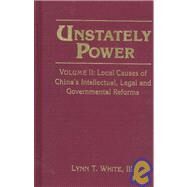Unstately Power: Local Causes of China's Intellectual, Legal and Governmental Reforms
, by Unknown- ISBN: 9780765601483 | 0765601486
- Cover: Hardcover
- Copyright: 11/30/1998
As China's revolution winds down, the world's most populous country has seen profound changes in ideology, religion, media, and arts, and alterations on the social and political landscape, most evident in police and legal reforms. This important new study from a leading China hand shows how social diversification during the economic boom has modified political norms and public practices -- contrary to the nostalgic hopes of many establishment conservatives. White maintains that while political reforms have emerged partly from the local resources created by economic boom (as detailed in the companion volume), these reforms have equally come from new norms among individuals and small groups. In comparing China's current situation to that of other countries and their revolutions, it is clear that China's reforms have followed a similar pattern; as the revolution's wave crests, the tide predictably changes and symbolic and police centralization ebb as local governance rises. The rapid modernization of China has necessitated development of new methods of maintaining coercive order at the local level, while the state political institutions grapple with new methods for selecting new leaders and adopting new laws. As China's regime type becomes more corporatist and less Leninist, the old traditional claims of intellectuals to state power have weakened. Indeed, intellectuals, ranging from clergy to students, have developed more regionalist and foreign interests. Ironically, the articulate "civil society" has often remained statist, straining against the many changes in established local networks.







